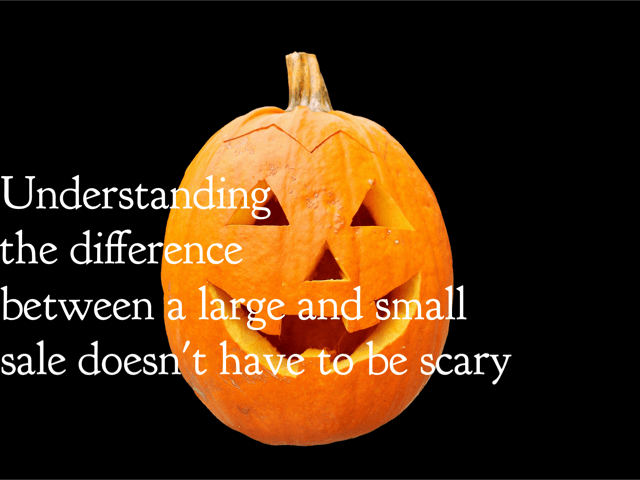Distinguishing between a small and large sale
If you get the chance, read the best-selling book Spin Selling authored by Neil Rackman. Rackman maintains throughout the book that there are fundamental differences between a small and a large sale and require different closing techniques. You will save a lot of time going into the prospect if you can tell the difference.
What defines a small sale?
This is best illustrated in an anecdote from Spin Selling. Rackman describes browsing an airport store whilst waiting for a connecting flight. He comes across a multipurpose swiss army knife and proceeds to buy it immediately for only $15. The length of time between the need arising and purchase was only a few seconds. A short transaction time is just one of the defining elements of a small sale.
Minimal risk is another defining feature of a small sale. Rackman only spent $15 on the army knife so there was a very small risk factor involved. Small sales are often impulsive decisions with emotional motives. Rackman did not need the army knife for any practical purpose and may not have purchased it if he had spent more time rationalising the decision. An emotional motive is more prominent in small sales.
How does a large sale differ?
Let’s use another scenario: imagine you are meeting a client cold for the first time. This client could potentially invest several thousand dollars into your company. So how are you going to get them to buy on the first call?
The best way to approach a sale of this magnitude is to have patience and expect the sale will take longer. Transaction time is longer for a large investment as the need is usually developed over a longer period of time.
Here a few sure-fire tips for learning how to recognise the difference:
- Larger sales contain more than one decision maker
- A larger sale will require asking more specific questions about the customers’ problem and finding a solution
- Larger sales will take longer as they require a rational decision-making approach on the customer or client’s behalf.
Understanding the psychology of your customer or client based on the type of sale you are making will take you a long way in your sales career.
Task
Write a list of all your large sale clients based on the size of the sale, then see if this stacks up against the criteria above.
Over time you should build a list of all your large sale clients in a notebook so you know to to work through all their problems.
Happy selling everyone!
Mike.
 Mike Brunel started Mikebrunel.com after being a successful entrepreneur and founder of NRS Media. He co-founded NRS Media in Wellington, New Zealand, expanded it into a global powerhouse in media sales and training, and was eventually responsible for opening offices in
Mike Brunel started Mikebrunel.com after being a successful entrepreneur and founder of NRS Media. He co-founded NRS Media in Wellington, New Zealand, expanded it into a global powerhouse in media sales and training, and was eventually responsible for opening offices in
London, Atlanta, Toronto, Sydney, Capetown, and Bogota. His products and services are now sold in 23 countries and in 11 languages generating $250 million annually in sales for his clients. Mike sold the company in 2015 and now spends his time following his passions which include rugby, travel. His promise: “I can find thousands of dollars in your business within minutes – GUARANTEED” TRY ME OUT!

